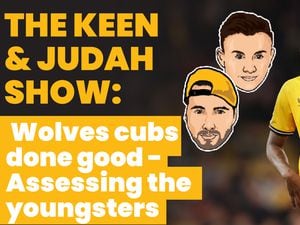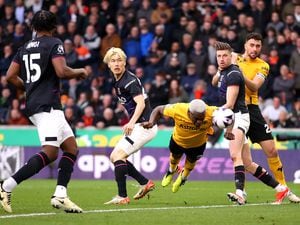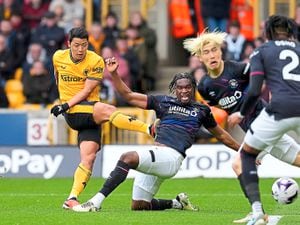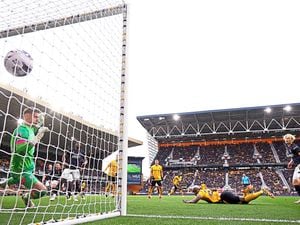Johnny Phillips: Wolves have not lost their soul... but it may be just a little harder to find
“Infamy. Infamy. They’ve all got it in for me!” cried Julius Caesar in Carry on Cleo. Or maybe they were the thoughts of Jeff Shi after the second Ask Wolves series aired this week.
The Wolves chairman generated the most headlines of all the interviewees after a bold and calculated statement which rode roughshod over the loyalty of the people who fill the seats at Molineux every season.
The days of the match-going supporter being prioritised have passed at the top of English football. In conceding that the global fanbase is “more and more important” Shi has run the risk of upsetting the lifeblood of the club, who should never be taken for granted.
Some supporters may feel like the jilted lover, walking hand in hand down the street while their partner is looking over their shoulder at a more attractive proposition heading past the other way. Nobody wants to be told they are not the most important thing in life.
But there is no harm in Shi making this abundantly clear. Fosun bought Wolves for its potential and have already pumped millions into the club to raise its profile to the extent where a new revenue stream can be exploited through brand awareness.
As Shi said, globally, Wolves now means different things to different people. Here, supporters will only ever care about the football club but overseas there is another strand which can attract a fresh audience. Wolves simply cannot generate the necessary revenue from its heartlands, and are still miles behind the big six in this area.
Owners and supporters do not always live in harmony at the top.
At England’s two biggest football clubs they have rarely been on the same page in recent years. Any season-ticket holder at Old Trafford will tell you how they have been treated since the Glazers came on board.
At Liverpool, a club which exploits the mythology of its fanbase and the romance of The Kop, FSG have little regard for the match-goers. In 2016 they had to embarrassingly u-turn after a mass walk-out following appalling ticket price increases. Last year they signed up for the European Super League.
What FSG have got right, in contrast to the Glazers, is a recruitment policy that has allowed a top manager to build a dynasty. Supporters can live with most gripes if the team is performing.
Rather than any impressive numbers in the e-sports world, Wolves fans will look to the transfer activity this summer as the only gauge of Fosun’s continued ambition. In this regard, it is disingenuous of anyone at the club to suggest there are homegrown players ready to step into the breach.
Given the stalled squad strengthening of the last two windows, Wolves need their best window since the summer of 2018 if there is to be meaningful progress on the pitch. A botched window and it does not take a huge leap of faith to envisage the team scrapping around at the wrong end of the table next season.
“I have a good plan in my mind to create a good squad that gives us more consistency and it will be exciting for the fans,” said Bruno Lage, encouragingly.
The head coach will hope business can be done as early as possible to give him the best chance of a productive pre-season.
Yet, suggestions from Shi that players could be targeted on their geographic profile to help build the supporter base raise alarm bells.
The Raul Jimenez effect for Wolves in Mexico is a happy by-product of a player who delivered on the pitch in the Premier League, first and foremost. Attempts at replicating this could lead down a dangerous path.
Supporters are no mugs and many are frustrated with the change in discourse.
The naïve early pronouncements of breaking into the Premier League’s elite have been tempered now that Fosun have a better understanding of what that requires. The ownership has not so much steered the vessel on a different course as rowed all the way back to the boathouse.
Shi said he shouldn’t be held accountable for comments made six years ago. That is wishful thinking.
But any doubts that Wolves are not a priority for Fosun were cast aside with the chairman stating, “Wolves is always the main asset for us, for Fosun Sport.
Even in the future, Fosun Sports has more things to come, but Wolves is still the main part.” Again, that is clear messaging.
The owners know that their success off the field relies entirely on the team being in the Premier League. Russell Jones, the general manager at the forefront of global brand expansion, also spelled this out in his Ask Wolves episode.
With plans to float Fosun Sports Group in the future, there is no way Wolves can drop out of the Premier League if that is to take place.
Supporters would benefit from a detailed set of accounts which illustrate the revenues being generated in these innovative strands of the business separate from the football revenues. That would certainly allay fears that the club is chasing a nebulous market which reaps no tangible rewards.
What cannot be questioned is the level of communication in a series such as this, from Shi and others. No other club opens its doors so candidly as Wolves have done, even if the content is not always palatable.
The failure to tackle the problem of the Steve Bull Stand does not sit well. A few plans have been pushed around the table but nothing is happening imminently, while supporters suffer the brunt of outdated facilities.
The least ambitious idea, to reconfigure the current structure, would be a £20million investment with a 15-year payback. That even this is not being prioritised just gives ammunition to those who claim match-going fans are being sidelined. Fosun’s mantra is entrepreneurship and innovation but there is little movement on upgrading this embarrassing relic.
The over-riding message was one of long-term self-sustainability achieved through pursuing new avenues of growth, for a club which is heading into an impressive fifth successive season at this level.
Aside from some clumsy rhetoric, Fosun and Shi – as their spokesman – have ruffled feathers simply for being modern owners. This is what the Premier League has created and the fight to thrive in it has demanded something that can leave supporters feeling ostracised. Where is the soul?
It was only two eras ago that Wolves had their most popular owner in history.
Sir Jack Hayward never missed an opportunity to tell fans how much he loved them, how he was one of them. He did plenty of good for this club and has gone down in folklore accordingly, but his symbolic patriotism – ‘Union Jack’, local lad made good, one of us – often let him off the hook when it came to the actual administration of the club.
Particularly when he twice installed his sons as chairmen without so much as a ripple of disapproval amongst the support or local media, when neither men had ever worked in the football industry before and would never do so again. That is just an element of the issues of that regime which led to 17 largely wasted years of ownership.
Fosun are very different and have succeeded so far. This international investment conglomerate is trying to grow the club through new means within Fosun Sports Group.
Fans feel powerless in the face of this corporate alignment but results on the pitch offer a strong case for the defence of Shi and Fosun’s methods.
In weeks like this it may seem harder to find, but the soul of Wolves will always be with its supporters at Molineux.
“We know now in these days modern football is a little bit different, it’s more like an industry,” said Lage. “We need to understand also the policy of the club, but in the end, what is the point? The point is the fans.”





